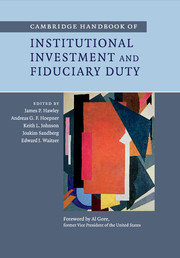Book contents
- Frontmatter
- Contents
- List of figures
- List of tables
- List of contributors
- Foreword
- 1 Introduction
- Part I Fiduciary duty: a global outlook
- Part II Fiduciary duty and the landscape of institutional investment
- Part III Challenging conventional wisdom on fiduciary duty
- Part IV Towards a broader interpretation of fiduciary duty
- Part V Beneficiaries’ roles and viewpoints
- Part VI Fiduciary duty and governance
- 30 Investors and global governance frameworks: broadening the multi-stakeholder paradigm
- 31 Promoting corporate sustainability through integrated reporting: the role of investment fiduciaries and the responsibilities of the corporate board
- 32 Reporting and standards: tools for stewardship
- 33 US corporate governance, fiduciary success and stable economic growth
- 34 Fulfilling fiduciary duties in an imperfect world – governance recommendations from the Stanford Institutional Investor Forum
- 35 Addressing the participation gap in institutional investment: an assessment framework and preliminary results
- 36 The costs of fiduciary failure – and an agenda for remedy
- Index
- References
32 - Reporting and standards: tools for stewardship
Published online by Cambridge University Press: 05 April 2014
- Frontmatter
- Contents
- List of figures
- List of tables
- List of contributors
- Foreword
- 1 Introduction
- Part I Fiduciary duty: a global outlook
- Part II Fiduciary duty and the landscape of institutional investment
- Part III Challenging conventional wisdom on fiduciary duty
- Part IV Towards a broader interpretation of fiduciary duty
- Part V Beneficiaries’ roles and viewpoints
- Part VI Fiduciary duty and governance
- 30 Investors and global governance frameworks: broadening the multi-stakeholder paradigm
- 31 Promoting corporate sustainability through integrated reporting: the role of investment fiduciaries and the responsibilities of the corporate board
- 32 Reporting and standards: tools for stewardship
- 33 US corporate governance, fiduciary success and stable economic growth
- 34 Fulfilling fiduciary duties in an imperfect world – governance recommendations from the Stanford Institutional Investor Forum
- 35 Addressing the participation gap in institutional investment: an assessment framework and preliminary results
- 36 The costs of fiduciary failure – and an agenda for remedy
- Index
- References
Summary
Introduction
“Our Common Future,” the 1987 report of the World Commission on Environment and Development and generally referred to as the Brundtland Report, implored each generation “to meet the needs of the present without compromising the ability of future generations to meet their own needs” (United Nations 1987: Chapter 2, para. 1). A critical question raised by the Brundtland Report definition of “sustainable development” is whether each generation and institutions established by society have an obligation, legal or moral, to address intergenerational responsibility.
The concept of intergenerational responsibility – like so many issues and problems that confront society today – is a classic collective action problem and no single group or person can solve the problem without help. Who will lead and what can an individual or group do?
The fiduciary duties of intergenerational impartiality and loyalty, i.e., duties that preclude fiduciary investors from using strategies that unreasonably transfer risk and returns between different groups of benei ciaries are found in law and pension fund bylaws (CalPERS 2009). Under the universal owner concept, a fundamental characteristic is to care about economy-wide performance in addition to the performance of companies in a portfolio (Hawley and Williams 2000). Finally, the concept stewardship, which dates back to the medieval era, refers to a duty to look after someone else’s assets.
- Type
- Chapter
- Information
- Publisher: Cambridge University PressPrint publication year: 2014
References
- 1
- Cited by



